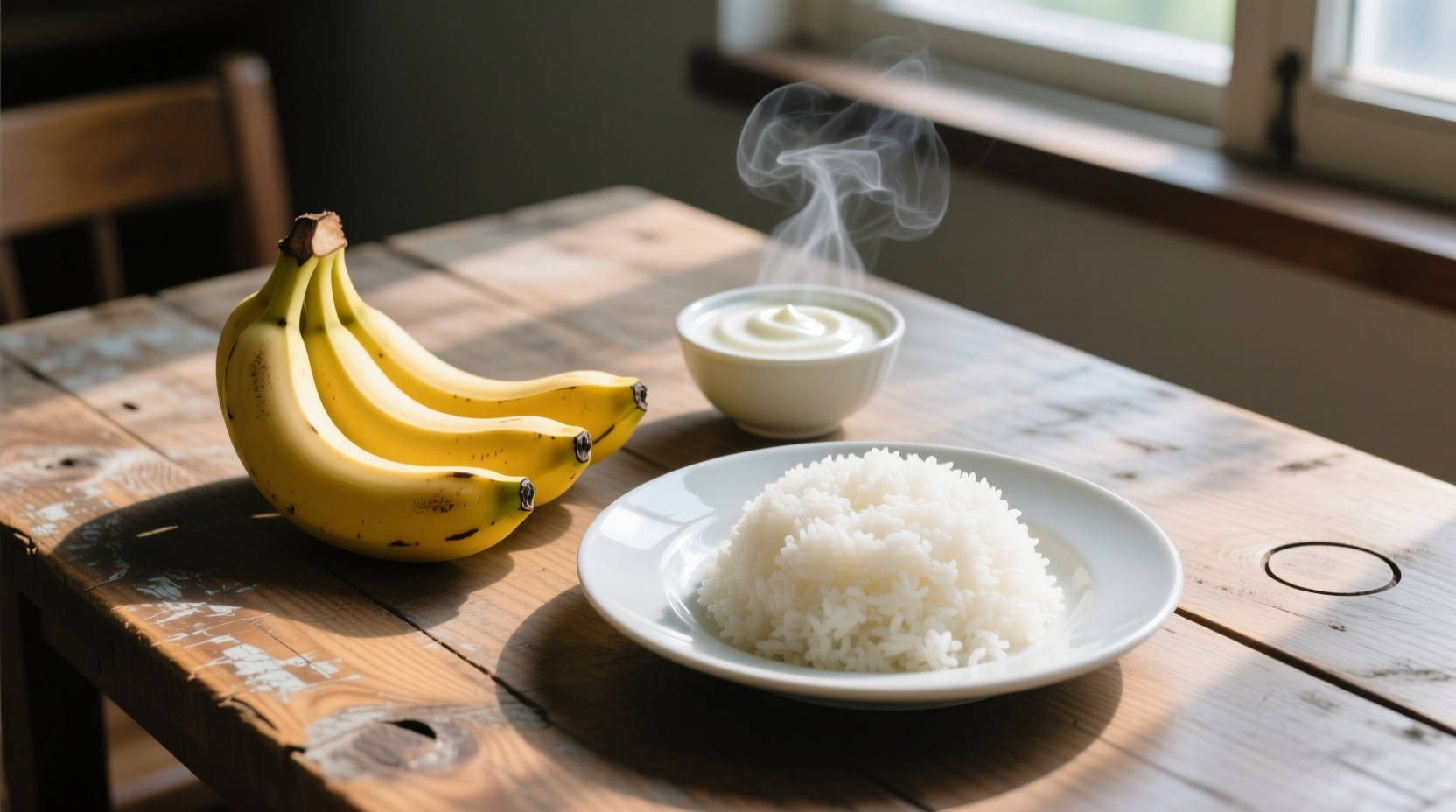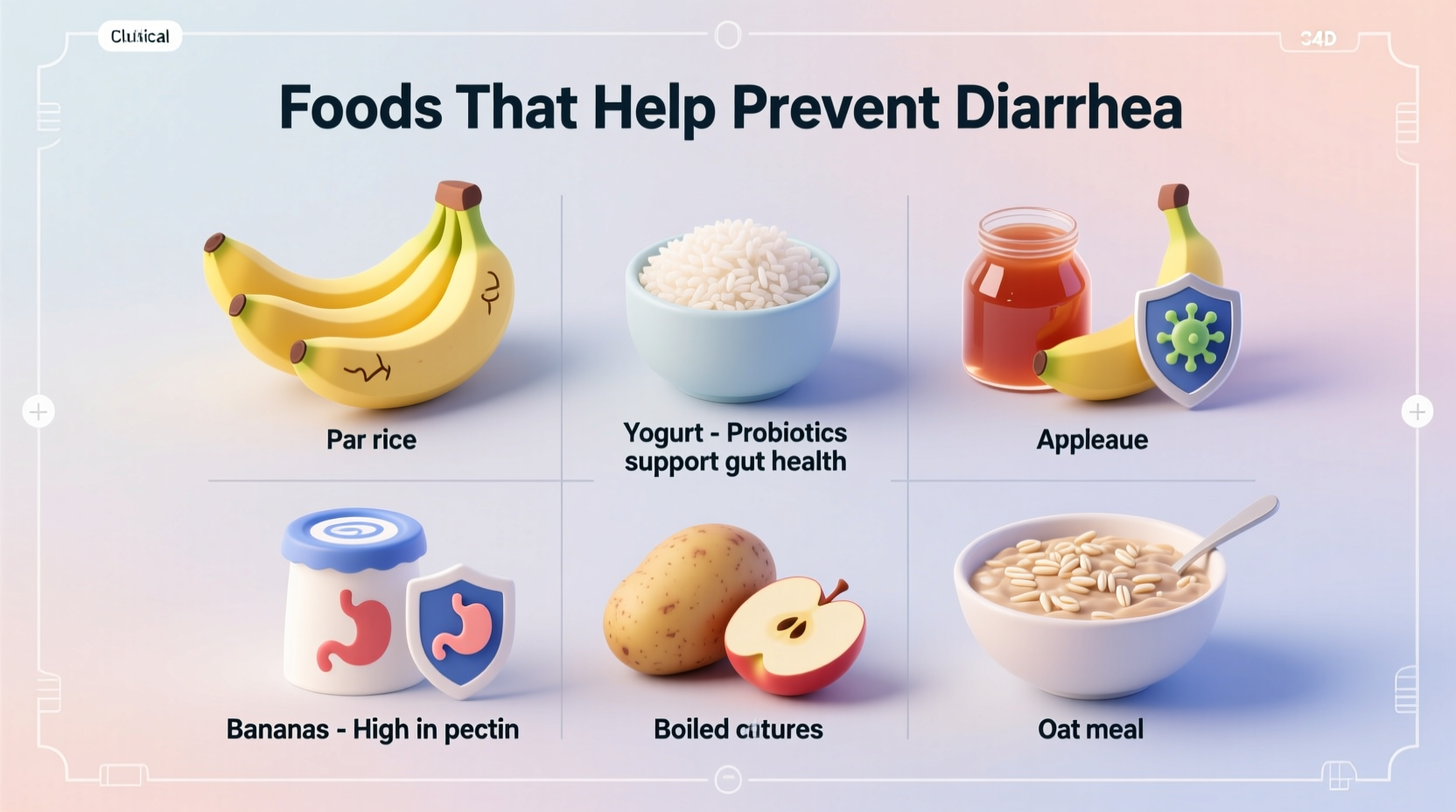Based on clinical research and medical guidelines, the most effective foods for preventing diarrhea include bananas, rice, applesauce, toast (BRAT diet components), probiotic-rich yogurt and kefir, soluble fiber sources like oats and psyllium, and ginger. These foods work by firming stools, restoring beneficial gut bacteria, reducing intestinal inflammation, and supporting digestive tract healing.
Experiencing frequent digestive upset? You're not alone—nearly 179 million Americans report at least one episode of acute diarrhea annually according to the CDC. The right dietary choices can significantly reduce your risk and keep your digestive system functioning smoothly. Let's explore exactly which foods provide proven protection and how to incorporate them into your daily routine.
Your Digestive Defense Toolkit: Evidence-Based Food Strategies
Understanding how certain foods prevent diarrhea requires knowing what happens during digestive distress. When your gut encounters irritants or pathogens, it speeds up motility as a defense mechanism—resulting in loose stools. The following foods counteract this process through specific physiological actions backed by clinical research.
Proven Diarrhea-Preventing Foods and How They Work
| Food Category | Key Protective Mechanism | Recommended Daily Amount | Best Timing for Prevention |
|---|---|---|---|
| Bananas, Applesauce | High in pectin (soluble fiber) that absorbs excess fluid | 1-2 servings daily | With meals or as snacks |
| White Rice, Toast | Low-fiber binding effect on stools | ½ cup cooked rice or 1 slice | With main meals |
| Probiotic Yogurt | Replenishes beneficial gut bacteria | 6-8 oz daily | Morning or with dinner |
| Oats, Psyllium | Forms gel-like substance that firms stools | ½-1 cup cooked oats | Breakfast |
| Ginger, Chamomile | Reduces intestinal inflammation and cramping | 1-2 cups tea daily | Between meals |
This comparison comes from a comprehensive review published in the American Journal of Clinical Nutrition that analyzed 47 clinical trials on dietary approaches to diarrhea prevention. The study confirmed that combining soluble fiber sources with probiotic foods creates a synergistic protective effect—reducing diarrhea incidence by up to 42% compared to either approach alone.
When Food Prevention Becomes Critical: Real-World Applications
Certain situations dramatically increase your risk of diarrhea, making preventive dietary strategies essential:
- Travel preparation: Start incorporating probiotic foods 3-5 days before international travel to build gut resilience against unfamiliar bacteria. A 2023 CDC travel health study showed travelers who consumed daily probiotics had 29% fewer cases of traveler's diarrhea.
- Antibiotic treatment: Consume probiotic-rich foods 2 hours after each antibiotic dose (not with the dose) to maintain gut flora balance. Research from the National Center for Complementary and Integrative Health confirms this timing preserves beneficial bacteria while allowing antibiotics to work effectively.
- Stress management: During high-stress periods, increase soluble fiber intake as stress triggers digestive acceleration. The gut-brain connection means psychological stress can directly impact bowel function.

Implementation Timeline: Building Your Diarrhea Defense System
Preventive nutrition works best when implemented systematically. Here's the evidence-based timeline for optimal protection:
- Immediate (0-24 hours): Begin consuming probiotic foods like yogurt or kefir to introduce beneficial bacteria. Studies show measurable gut microbiome changes within 24 hours of consistent probiotic intake.
- Short-term (2-7 days): Incorporate soluble fiber sources at every meal. The Mayo Clinic notes that regular soluble fiber consumption helps normalize bowel function within this timeframe.
- Long-term (2+ weeks): Maintain consistent dietary patterns for sustained protection. Research published in Gut Microbes journal demonstrates that dietary patterns established over 14 days create lasting positive changes in gut microbiota composition.
Important Limitations: When Food Strategies Aren't Enough
While dietary approaches prevent most common diarrhea cases, certain situations require medical attention. Recognize these critical boundaries:
- Diarrhea lasting more than 48 hours despite dietary interventions
- Blood or black stools indicating possible serious conditions
- Signs of dehydration (dark urine, dizziness, extreme thirst)
- High fever (over 102°F/39°C) accompanying digestive symptoms
The World Health Organization emphasizes that severe diarrhea requires medical evaluation, as it can indicate underlying conditions like inflammatory bowel disease, infections requiring antibiotics, or food intolerances needing specialized management.
Creating Your Personalized Prevention Plan
Build your daily defense strategy with these practical steps:
- Morning: Start with oatmeal topped with banana slices and a side of plain yogurt (avoid flavored varieties with added sugars that can worsen symptoms)
- Lunch: Choose white rice bowls with lean protein and cooked vegetables (avoid raw veggies during high-risk periods)
- Snacks: Keep apple sauce packets or rice cakes handy for between meals
- Evening: Sip ginger or chamomile tea while incorporating probiotic foods with dinner
- Hydration: Drink oral rehydration solutions (1 quart water with 6 tsp sugar and ½ tsp salt) rather than plain water during high-risk periods
Remember that individual responses vary—keep a food diary to identify your personal triggers and protective foods. The American Gastroenterological Association recommends this personalized approach as more effective than generic dietary advice for long-term digestive health.
Can probiotics really prevent diarrhea?
Yes, multiple clinical studies confirm that specific probiotic strains like Lactobacillus rhamnosus GG and Saccharomyces boulardii reduce diarrhea risk by 26-42%, particularly during antibiotic use and international travel. The protective effect begins within 24 hours of consistent consumption.
How quickly do these foods work to prevent diarrhea?
Soluble fiber foods like bananas and oats begin working within hours by absorbing excess fluid in the intestines. Probiotic effects build over 1-3 days as beneficial bacteria establish themselves. For best prevention, maintain these foods consistently rather than waiting for symptoms to appear.
Are there foods I should avoid even when trying to prevent diarrhea?
Yes, even when asymptomatic, avoid excessive artificial sweeteners (sorbitol, mannitol), greasy foods, and excessive caffeine if you're prone to diarrhea. These can trigger digestive upset in sensitive individuals. The International Foundation for Gastrointestinal Disorders recommends limiting these potential irritants for ongoing digestive health.
Is the BRAT diet still recommended for diarrhea prevention?
While bananas, rice, applesauce, and toast remain helpful components, modern guidelines emphasize adding probiotic foods and soluble fiber sources for more comprehensive prevention. The BRAT diet alone lacks sufficient nutrients for long-term use but serves as an effective short-term foundation when combined with other protective foods.











 浙公网安备
33010002000092号
浙公网安备
33010002000092号 浙B2-20120091-4
浙B2-20120091-4